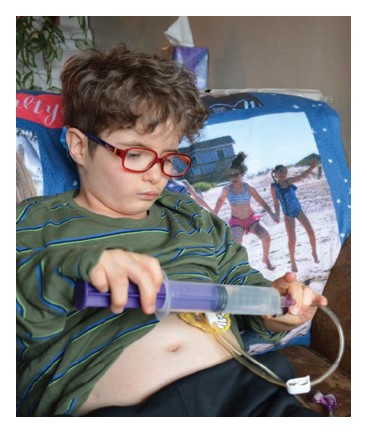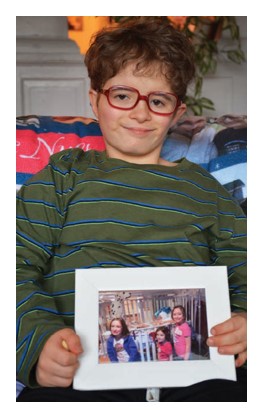- Home
- Education and Events
- About PHA
- Advocacy
- Federal
- State
- Advocacy Toolkit
- Advocacy in Action
- About Care at Home
- Join PHA
- Find a Provider
- Contact Us
Strength in Help: Home Nursing Transforms the McNulty Family's Life
In his toy-adorned room, a feeding-tube stand casts a thin shadow over Case McNulty and his mom, Elisabeth, as they sit on his adjustable bed untangling a long string of colorful beads, called Beads of Courage. The pair points out specific milestone baubles, each representing one of the hundreds of medical procedures and surgeries Case has endured. In all, he has fought heart and brain anomalies, having one kidney, craniosynostosis and tethered spinal cord corrections, a pseudo obstruction and neuropathic dysmotility in his intestines and dependence on a feeding tube. “Case has undergone more trials in his eight years than most people do in their life,” Elisabeth says, “yet he’s happier than just about anyone I’ve ever met.” Colored by the youthful energy of Case, his three older sisters – Meredith (14), Samantha (13) and Lainey (10) – Taco the dog and two cats, that happiness blankets the bustling McNulty household in Johnstown. Case’s mom and dad, Daniel, steer the family ship like any other working parents of four kids do – with a few exceptions. Family dinners, homework and soccer matches synchronize with daily home nursing visits, medical emergencies and holidays celebrated in the hospital. For the McNultys, the typical complaints of life’s minor annoyances have quieted because they no longer take anything for granted since Case’s birth. “When things come your way, you can either choose to make the best of it and face it head on or you can let it drive you,” Daniel says. “When you’re having a good run with things, you just run with it … because it can quickly be taken away,” Elisabeth says. The parents of three healthy girls, Elisabeth and Daniel were 26 and 27 when Case was born. “When I was pregnant with him, Case was sick,” Elisabeth says. “It was pretty intense from the beginning. We lived in Altoona at the time, and we went When he was at 38 weeks, on Dec. 21, 2010, the doctors at UPMC Magee-Womens Hospital in Pittsburgh performed a C-section because Case had stopped growing at 28 weeks. At birth, he was 2 pounds, 13 ounces. Case was quickly moved to an incubator and then transferred to the NICU at UPMC Children’s Hospital of Pittsburgh. “We didn’t know what was happening at that point,” Elisabeth says. “We didn’t know if he was OK or not.” “I saw him in the incubator once they took him out of the room, and I have a picture from that,” Daniel recounts. “They life-flighted him over to Children’s. I remember sitting in his room crying because I just didn’t know.” Daniel bounced from his wife’s side in one hospital to his son in the NICU of another hospital to his three daughters in Altoona. Elisabeth paced the halls, trying to avoid hearing other babies. “People would be like, just take it day by day, but I felt like if I could just get through the next 15 minutes, then 15 more,” Elisabeth describes. Elisabeth got to hold Case for the first time on Christmas Eve, then for 15 minutes each day for the first several weeks. Case fought and persevered through multiple congenital anomalies, and when he reached the weight milestone of 4 pounds, 1 ounce, he was allowed to go home. At 11 months old, Case was 9 pounds and the constant care he required took a toll on the family. The three girls pitched in when they could, but Daniel still had to go to work and Elisabeth was pushing herself to exhaustion, racking up an unsustainable sleep debt. The family needed to regain a sense of normalcy in their lives, and home nursing proved to be the answer. “Case was 15 months when the homecare started, and we should have started a lot sooner,” Elisabeth explains. “The nursing was lifechanging. I remember telling them that I just needed four nights, and I’ll be fine. I didn’t want people in my house all of the time. But it turned out that we really needed seven nights because I wasn’t getting any sleep.” Case receives approximately 124 homecare hours a week – eight hours a night all week, 12 hours during the day Monday through Friday and eight extended household duty hours a week. Outside of the overnight and daytime hours, household duty hours allow parents time for catching up on cleaning, errand running and their own medical appointments. Each year, the hours are reassessed. With so many hours of homecare, the McNultys admit that it was a significant adjustment having a stranger in their home, especially overnight while they slept. “It was like being a guest in your own home,” Daniel explains. “I always think that I can’t just run out of the room in my underwear. But that awkwardness didn’t last too long. Now when they come in, it’s like they’re part of the family. Sometimes, I count down the minutes until the nurse comes.” Elisabeth agrees. “You feel like you can clock out. You feel like he is safe, and you can sleep. It definitely gets easier. They don’t feel like strangers anymore; they feel like an extended part of your family.” 
The McNultys tried to care for Case on their own because they felt it was the only way, but they realize now that no one can do it all, that it’s OK to ask for help. “Stop trying to be super,” Elisabeth says. “You’re going to completely drown in the weight of all the medical needs and demands you have. When you have something as incredible as home nursing, and you have insurance that’s going to cover it, you have to go with it. Know that they’re there for the greater good and that it’s going to make your entire family unit stronger. When you look back, you’re going to know that the most important thing you did was allow these professionals into your life to help your world become just a little easier and calmer.” The McNultys each carry an inner strength that few have had to unlock. It’s the source of the undeniable happiness that fills their home. They live in and enjoy each moment because they know Case’s already lengthy string of beads might grow, and they’ll get through it with help. “Every day, it surprises me,” Daniel says. “You think that you can’t handle something or you’ve reached your limit, then something else happens. You just keep going. … He’s more than just the bravest boy; he’s the bravest person. When he goes to the hospital and has a surgery, he’s just like, ‘Let’s do this.’” “It’s always been our approach that, no matter what stage he’s in or what’s happening, we will absolutely enjoy every minute of him, where he is right now,” Elisabeth says. “Tubes or no tubes, sick or not sick, we enjoy him. If the next season brings something better or worse, then that’s just the next season. The strength comes along the journey.” The McNultys maintain a popular Facebook page and website dedicated to their family’s story. Visit facebook.com/averyspecialfamily and averyspecialfamily.com. |


 to Johnstown and Pittsburgh for sonograms. Every time we went, things were worse. Then, they didn’t expect him to live past birth.”
to Johnstown and Pittsburgh for sonograms. Every time we went, things were worse. Then, they didn’t expect him to live past birth.”